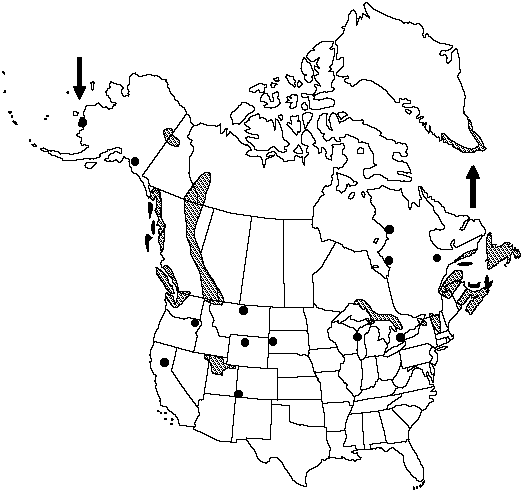Asplenium trichomanes-ramosum
Sp. Pl. 2: 1082. 1753.
Roots not proliferous. Stems short-creeping or ascending, frequently branched; scales dark reddish brown to blackish throughout, narrowly deltate, 2–4 × 0.2–0.4 mm, margins entire to undulate or with widely spaced shallow teeth. Leaves monomorphic. Petiole reddish brown at base, green distally, lustrous, 1–5(–6) cm, 1/4–1/2(–1) times length of blade; indument of dark reddish brown to black, narrowly deltate scales grading into glandular hairs. Blade linear, 1-pinnate throughout, 2–13 × 0.6–1.2 cm, thin, glabrous or with sparse minute hairs; base slightly tapering or truncate; apex acute, not rooting. Rachis green throughout, dull, glabrous or with scattered hairs as on petioles. Pinnae in 6–21 pairs, deltate to rhombic; medial pinnae 5–6 × 4–5 mm; base obtuse and often inequilateral; distal margins crenate; apex rounded to acute. Veins free, evident. Sori 2–4 pairs per pinna, on both basiscopic and acroscopic sides. Spores 64 per sporangium. 2n = 72.
Habitat: Limestone and other basic rocks
Elevation: 0–4000 m
Distribution

Greenland, Alta., B.C., N.B., Nfld. and Labr. (Nfld.), N.W.T., N.S., Ont., P.E.I., Que., Yukon, Alaska, Calif., Colo., Idaho, Maine, Mich., Mont., Nev., N.Y., Oreg., S.Dak., Utah, Vt., Wash., Wis., Wyo.
Discussion
Hybridization between Asplenium trichomanes-ramosum and A. trichomanes produces the fertile allotetraploid A. adulterinum, which occurs on Vancouver Island.
Selected References
None.